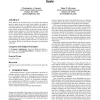Free Online Productivity Tools
i2Speak
i2Symbol
i2OCR
iTex2Img
iWeb2Print
iWeb2Shot
i2Type
iPdf2Split
iPdf2Merge
i2Bopomofo
i2Arabic
i2Style
i2Image
i2PDF
iLatex2Rtf
Sci2ools
120
click to vote
ACMICEC
2007
ACM
2007
ACM
The game of scale: decision making with economies of scale
While diffusion of innovation topics in economics and majority games in game theory have been widely studied, the impact of economy-of-scale effects in aggregated decision making has received little attention. In this paper, we present a basic model, the Game of Scale, to study the effects of economy-of-scale in decision making among a large pool of self-interested agents. We solve the model's static equilibria and present two dynamic decision models, one myopic and one trend-following. Most of the parameter space converges quickly; however, the behaviors exhibited near critical input values show drastic changes. We demonstrate how trend-following can improve global outcomes over myopic decision making. Finally, we describe how the game can be externally controlled. Categories and Subject Descriptors J.4 [Computer Applications]: Social and Behavioral Science-Economics; K.4.4 [Computing Milieux]: Computers and Society--Electronic Commerce General Terms economics, theory Keywords e...
Related Content
| Added | 12 Aug 2010 |
| Updated | 12 Aug 2010 |
| Type | Conference |
| Year | 2007 |
| Where | ACMICEC |
| Authors | Christopher J. Hazard, Peter R. Wurman |
Comments (0)

